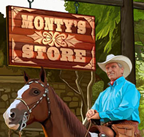Hi all,
While putting the first thing on my horse's back of his life (a lunging roller), the other day, he pigrooted/bucked a little bit as he ran around, trying it out. This, of course, was to be expected. A few times, when he carried on a bit, I let a few "good boys" slip, in a calming voice, in an attempt to convey that there was no need to be scared. We then joined up and had some quality time. All good.
A lady at the stables was watching me as I started my horse. She is a very experienced lady, having started/rehomed over 1000 horses, most of them rescue. While not completely non-violent, as Monty would like, she is definitely at the non-violent end of the spectrum. When I was finished, she engaged me in a conversation regarding starting my horse.
Her comment was regarding the fact that I had said "good boy" when my horse kicked/bucked while wearing the lunging roller (just a reminder, this was a completely new experience for him). She said that this could be interpreted as an indication that he had done something pleasing to me, when it's actually behaviour that I want to phase out. She said that she found that it's best to establish right from the very start that when they are in work there is to be no bucking or carrying on of any kind. She establishes this by letting out a scary growl when a horse bucks with his first saddle. I am itching to get the forum's opinion on this! I argued with her that, in such a stressful time for a horse, a growl would surely be interpreted as "I am a threat to you and I am untrustworthy". She argues that a growl at the right time means "there will be none of that". In her experience, this leads to horses that are less likely to be cold-backed or play up under work.
I'm thinking that the right answer here is to not to growl, but to ignore negative behaviour or school it in other circumstances (i.e. with the dually and when possible), and to encourage positive behaviour when it occurs (with the voice or rub on the head, whatever is available). What are everyone's thoughts on this? How have you reacted when a horse bucks under the first saddle? What results do you think that got you?
Cheers! -Student :)




I'm not going to address the "growling issue", but I will say that I tend to agree with the lady that appreciating noises might very well establish "bad" behavior.
As I am typing this "on the run" in the morning, I may be wrong about this, but doesn't Monty say somewhere that if you go to sooth a nervous or frightened horse, it tends to get even more nervous. It's better then to ignore the fear and act calm and "normal" to show the horse that there is nothing there to be afraid of.
When he acts calmly, however, the praise is due.
.
If the horse isn't the least bit afraid, but bucks for fun, and to see if he can buck it off, I suppose waiting for it to find out "the hard way" that won't work is one solution, but at some point maybe it is wise to try and put a stop to it before bucking at the start of work becomes a habit.
I think sometimes we say "good boy" etc. as a way of soothing ourselves rather than the horse and reassuring ourselves that "it will be ok". In my opinion, the lady you are talking about is completely wrong in this particular instance. As you rightly point out, this is his first experience with anything on his back - he's not really paying an awful lot of attention to what you say and doesn't understand 'good boy' as positive or negative at this stage - he is completely preoccupied with dealing with the predator on his back! They SHOULD be allowed to buck and kick initially - this is their natural response (most first saddlers as you will see Monty say/do, buck). This process tells them that the thing actually isn't trying to hurt them and that that "thing round the middle" (girth) won't interfere with his ability to run, walk etc. If you inhibit this process as the lady is suggesting you get the horse to respond from fear. As you rightly say, a growl is a predatory and therefore violent response. The "now now none of that" is a pretty typical traditional response to the concept of "naughtiness" and is seen when dealing with human children and animals however while words reassure children (to a point!) they are meaningless to an animal unless they have learnt to make an association between words and behaviour after many repetitions. As we know, Equus is silent. While animals do understand 'words' it is about tones and patterns and I have done various tests with clients who are utterly convinced that their animal understands a particular word. However, it is body langauge that is the most powerful communicator and the animal learns to understand the lilt, tone, style of command given by voice. For example it is perfectly easy to teach a dog "Sit" with the word "Leprechaun" and you can teach a horse to "Trot on" (the traditional command used in UK) to the word "Sausages" said in the right way!
I suggest that with first saddles etc. you follow Montys principles and let them buck - if they know they are safe and it wont hurt them why would they buck in the future? If you don't let them find out, it may be that they try later. I watched Monty work with a bucker and it turned out he'd never experineced a saddle in canter because everytime he cantered, he bucked, rider fell off, he stopped. Monty put the saddle on, sent him round for Join Up, he bucked like hell (as Monty knew he would) and then settled down then rider got on, few minor movements then settled. Monty was very clear in saying that horses MUST experience the saddle at all gaits either loose or on longlines. So her view that growling at them leads to less problems later on is actually incorrect.
By God I love this forum!!! It's like a knowledge feast! Lol thanks heaps everyone. I too am "on the run in the morning", but I can't wait to respond to these reflections and add my own :D
With you eternal_student - When they are carrying on like that I tend to say in a very calming and gentle voice "steady boy". Same sound to the horses ears as "good boy" so perhaps try that next time! I wonder whether you will still get the same comments! Well done by the way - quarter horses are pretty full on when they are young and starting off!
Hi Maggie, thanks for that neat idea! Luckily he's 7 so he's not quite as full-on as he could've been!
I found something out today that I couldn't wait to get home and share with the MR Uni here- some people at my stables believe that my horse that I'm starting has been "already broke"! Lmao, I couldn't believe it! A friend of mine told me (and I'm sure that other people are thinking this) that I "hadn't been told the whole truth" from the previous owners, and that "this guy (my horse) has already been broke and handled, at least a bit". Omg, I am still laughing...
I have it from THE most reliable source (my own eyes, for one) that this QH had only been roped once a year for drenching. That's it. But my friend at the stables (who is extremely experienced- has studied Haute Ecole and all that jazz in Europe for years) can't accept that a horse can accept all these new things in such a seemingly easy way. It's just trust, my friend, the secret is trust! My boy and I have that so the world is our oyster! Plus, I was thinking, who is this clown who reckons he is so experienced? Doesn't he KNOW that if you can do Monty's methods you can do anything and make it look easy? Doesn't EVERYone know that? Haha I didn't say that... What a compliment! I'm still so surprised!